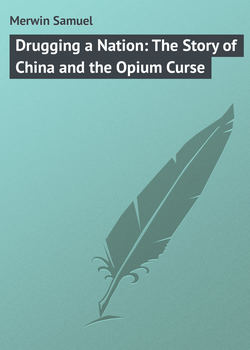Drugging a Nation: The Story of China and the Opium Curse

Реклама. ООО «ЛитРес», ИНН: 7719571260.
Оглавление
Merwin Samuel. Drugging a Nation: The Story of China and the Opium Curse
NOTE
I. CHINA’S PREDICAMENT
II. THE GOLDEN OPIUM DAYS
III. A GLIMPSE INTO AN OPIUM PROVINCE
IV. CHINA’S SINCERITY
V. SOWING THE WIND IN CHINA – SHANGHAI
VI. SOWING THE WIND IN CHINA – TIENTSIN AND HONGKONG
VII. HOW BRITISH CHICKENS CAME HOME TO ROOST
VIII. THE POSITION OF GREAT BRITAIN
Appendix – A Letter from the Field. THE OPIUM CLIMAX IN SHANGHAI
Отрывок из книги
In September, 1906, an edict was issued from the Imperial Court at Peking which states China’s predicament with naïveté and vigour.
“The cultivation of the poppy,” runs the edict, in the authorized translation, “is the greatest iniquity in agriculture, and the provinces of Szechuen, Shensi, Kansu, Yunnan, Kweichow, Shansi, and Kanghuai abound in its product, which, in fact, is found everywhere. Now that it is decided to abandon opium smoking within ten years, the limiting of this cultivation should be taken as a fundamental step … opium has been in use so long by the people that nearly three-tenths or four-tenths of them are smokers.”
.....
It would be pleasant to believe that the East India Company was sincere in this ineffective if well-phrased expression of “compassion.” The spectacle of a great corporation in any century giving up a lucrative traffic on merely human and moral grounds would be illuminating and uplifting. But unfortunate business corporations are, in their very nature, slaves of the balance sheet, organized representatives of the mighty laws of trade. I have already quoted enough evidence to show that the company was not only awake to the dangers of opium, but that it had deliberately and painstakingly worked up the traffic. Had there been, then, a change of heart in the directorate? I fear not. Among the East Indian correspondence of 1830, this word from the company’s governor-general came to light: “We are taking measures for extending the cultivation of the poppy, with a view to a larger increase in the supply of opium.” And in this same year, 1830, a House of Commons committee reported that “The trade, which is altogether contraband, has been largely extended of late years.”
G. H. M. Batten, a formal official of the Indian Civil Service, who contributed the chapter on opium in Sir John Strachey’s work on “India, its Administration and Progress,” has been regarded of late years as one of the ablest defenders of the whole opium policy. He believes that “The daily use of opium in moderation is not only harmless but of positive benefit, and frequently even a necessity of life.” This man, seeing little but good in opium, doubts “if it ever entered into the conception of the court of directors to suppress in the interests of morality the cultivation of the poppy.”
.....